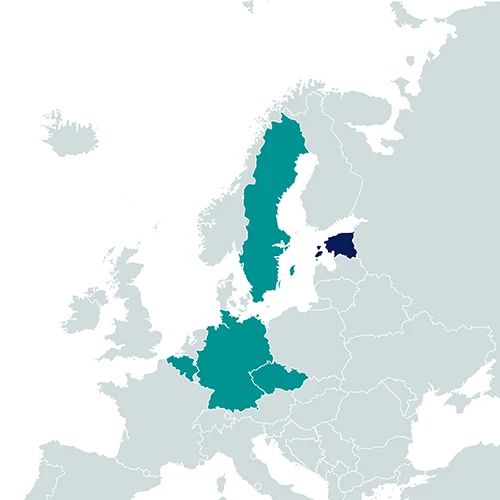2023-03-01 to 2026-02-28
Approx. 1,2 mil. EUR
-
Institute of Ecology and Earth Sciences – Department of Botany – Landscape Biodiversity Group, University of Tartu, Tartu, Estonia
-
Biology Department, KU Leuven, Heverlee, Belgium
-
Department of Population Ecology, Institute of Botany, Czech Academy of Science, Průhonice, Czech Republic
-
Institute of Biology – Geobotany and Botanical Garden, Martin Luther University Halle-Wittenberg, Halle (Saale), Germany
-
Centre for Biodiversity, Swedish University of Agricultural Sciences, Uppsala, Sweden

Loss in the area and connectivity of natural and semi-natural habitats in Europe over the last hundred years has placed not only numerous species under threat, but is also jeopardizing interactions between species crucial for maintaining important ecosystem functions and services, such as pollination. Furthermore, with nearly 90 % of flowering plants depending on animal pollinators, loss of pollination interactions may in turn significantly intensify the loss of wild plant species. FuncNet aims to improve understanding of the effects of the connectivity and management of semi-natural grasslands – hotspots of European biodiversity – on various aspects of plant-pollinator interactions in European agricultural landscapes.
-
To examine the role of spatio-temporal changes of grassland area and connectivity on plants and pollinators in remnant grasslands and other marginal grassland-like habitats of European rural landscapes.
-
To assess the resilience of plant-pollinator networks in relation to habitat connectivity.
-
To explore the genetic diversity, demography and individual fitness of insect-pollinated plants in response to landscape connectivity and related pollination events.
-
To map land-users’ and conservation practitioners’ perspectives of managing landscapes in favour of supporting plant-pollinator networks.
-
To provide recommendations to conservation practitioners, policy-makers and land-managers about the optimal planning and management strategies of agro-ecosystems in order to safeguard resilient plant-pollinator communities.
The project will focus on 10 regions in Belgium, Czech Republic, Estonia, Germany and Sweden, where grasslands were once common but have experienced drastic loss in area and connectivity due to land use change over the past century. We will explore the effect of both current and historic landscape characteristics on plant and pollinator diversity, and floral resource availability for insects. In addition to grasslands, we will explore other landscape elements (e.g., grassy road verges, field boundaries, power-line clear-cuts) to determine their role in supporting plants, pollinators and their interactions. Second, we will clarify the functioning of plant-pollinator interactions in maintaining the well-being and adaptive potential of wild plants. Third, we will map the main stakeholder groups, including land managers as well as conservation practitioners, and explore their motivations and obstacles for managing remnant grasslands and marginal landscape elements in a biodiversity-friendly way. Building on the results, the project will propose recommendations to maintain sustainable levels of plant and pollinator diversity at landscape-, community- and genetic level. Furthermore, we aim to develop win-win solutions for different stakeholder groups through improved multi-actor governance. The findings of this project would be of high relevance for achieving the goals of the European Green Deal and related strategies – the Biodiversity Strategy and the Farm to Fork Strategy, but will also support regional-scale policies to halt the loss of vital ecosystem functions and services.